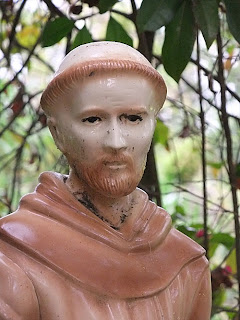Lights, Waiting, Blogging the Lectionary
(BTW, the Pin God First challenge is still on track.)
The gospel for this Sunday is Matthew 25:1-13. This parable is of the foolish and wise bridesmaids seems to preach an exclusion that I don't care for (aka doesn't fit my theology).
What to do then? How to reconcile the ending of unprepared foolish bridesmaids being left outside, strangers to the kingdom of heaven?
Commentators (I read a bunch this week) pontificated on the audience that the author of Matthew was writing for, apparently struggling not only to distinguish themselves from what was becoming rabbinic Judaism, but from those who truly waited for Christ's coming and those who said they did, but didn't mean it and recanted when persecution came their way.
Fine. But this theory is why the historical Jesus Seminar says this isn't really a Jesus saying.
And while that may be true, that seems like an excuse.
Sorry.
This isn't the first time in the Bible that there has been a call to be reAdy for the kingdom. God has called us to return to Him time and again since the first humans were asked to leave the Garden of Eden. Again and again, through leaders and prophets and reformers, God calls us back into right relationship with God. "Right" being nonabusive, reconciliation, responding in love. It's often called salvation history by theologians.
God doesn't give up on us. (Ok, except for the Flood, but even then...)
Every Sunday (at least until we change the Eucharistic service), we declare the mystery of faith;
Christ has died. Christ is risen. Christ will come again.
I am most emphatic on that last part, every time I say it. I am waiting for an hour that I know will come even though I have no idea what it will look like.
We wait for the kingdom of heaven like the bridesmaids wait for the bridegroom, like the servant waits for the master's return.
And what will the kingdom of heaven be like? This parable is embedded among others about the kingdom to come with varying degrees of judgement.
The kingdom that is here-near-not-quite-here.
For me, God's kingdom is not a kingdom of the dead (although I like to think there's a huge party going on in some other sphere while waiting for God's kingdom to be fully realized).
God's kingdom is of the living. Where the hungry are fed and there will be "no more crying or pain". Where God is seen in the least of these and is fed and cared for and loved.
The waiting is not passive. We move toward this, individually, communally, with God's help.
Right now, my church is in a time of transition, while we wait for a new rector to be called to lead us.
It is not a passive time. We mourn the departure of our two clergy (who have gone with our blessing to start answer God's call elsewhere -- blessed, but they are missed). It's nearly a yearlong process: we discern who we are now as a congregation, putting it into words before we even start looking at resumes and interviewing etc. We pray that we will find the one God has called to join us in our faith journeys. Meantime, we get on with the business of being the church.
Waiting is prayer-filled and co-creative, bringing the kingdom of heaven into realization one tiny bit at a time.
One little tiny bit of light at a time. Like the light of a lamp of a bridesmaid, showing the way to the kingdom of heaven.
That's what one commentator said about marriage in Jesus' time and land. The bridegroom comes home with his bride and the bridesmaids light his way home when darkness has fallen.
If the wise had shared with the foolish there would not have been enough light to last for the groom's journey home.
Without that light, can we see the way? Or do we stumble, get distracted from the waiting?
With that light, we can see Christ in the one who approaches, whether he looks like a bridegroom or a beggar.
With that light, we act in kindness, we feed, we clothe, we heal, we shelter, we mentor, we love.
With that light, we get the kingdom party started.


I struggle with the exclusionary passages too. (Also, the parables are hard to understand, especially for those of us removed from the culture at a distance of 2,000 years). However, in general I believe in free will - people will get what they want. God is not a rapist: He will not force the materialist to give to the poor; He will not force me to be kind to my husband when I'm in a bad mood; He will not force anyone to love their neighbors. Hell/ darkness is something inside us if we let it in, and only we can agree to let it out. (That said, God is also merciful, and I know in my own life He's given me all the help a person could ask for :) I like your comment that the wise brides should have offered to share!
ReplyDeleteIt's the end of the week and I'm catching up on comments -- and I think re-reading what I wrote about the other parables of the kingdom is gonna help tackle this week's.
Delete